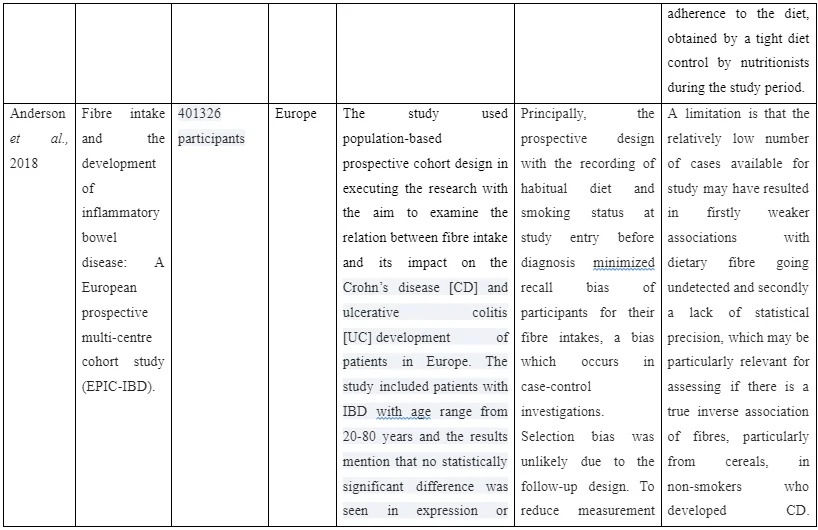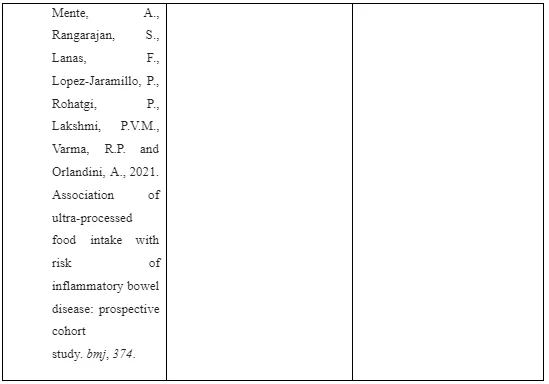Age-Related Patterns and Contributing Factors
Background of the Topic
Inflammatory Bowel Disease (IBD) is seen to occur at different level in individuals and mostly people before reaching the age of 30 years develop the disease. However, in some individuals, it does not develop until the individuals reach 50-60 years of age (Lamb et al., 2019). In the study by Nimmons and Limdi (2016), it is mentioned that 10-15% of the individuals suffer from IBD who are above the age of 60 and 5-25% of the individuals who suffer from IBD are adolescent and children within the age of 30 years. The IBD is also raised among individuals due to cigarette smoking. This is because harmful chemicals present in cigarette smoke hinder the lining of the digestive tract leading individuals to develop the disease (Jones et al., 2020). For researchers exploring these aspects, seeking healthcare dissertation help can provide additional insights and guidance on the complexities of IBD.
The symptoms of Inflammatory Bowel Disease (IBD) include abdominal pain, gas and bloating, diarrhoea, unexplained weight loss, upset stomach and others. Since IBD mainly affects the digestive tract, thus individuals with the disease face hindered ability to eat foods to maintain nutrition required in the body to remain healthy (Moulton et al., 2019). The lack of effective management of IBD creates various complications such as development of colon cancer, skin and eye inflammation, primary sclerosing cholangitis and blood clots in veins and arteries (Gracie et al., 2018). The IBD is diagnosed through stool studies and use of different endoscopic procedures such as colonoscopy, flexible sigmoidoscopy, capsule endoscopy and others (Flynn and Eisenstein, 2019). In order to treat IBD, various treatments are available such as use of immune system suppressors, anti-inflammatory drugs, antibiotics, diet control and others (Axelrad et al., 2018). In this study, the diet control to be managed and foods to be provided to the people suffering from IBD are to be discussed to avoid the complicated risk faced with the progression of disease due to hindered management.
Rationale
In the UK, Inflammatory Bowel Disease (IBD) is reported to affect nearly 1 in 250 people and with time the prevalence of the disease is rising (RCGP, 2020). In the study by Pasvol et al., (2020), it is mentioned that according to crude estimates 28.9%, 10.2% and 15.7% people in the UK are suffering from Inflammatory Bowel Disease (IBD), Chron’s Disease (CD) and Ulcerative Colitis (UC). As per reports in 2018, nearly 725, 397 and 276 individuals out of 100,000 people are found to be affected by IBD, UC and CD in the UK (Pasvol et al., 2020). This indicates that the presence of IBD is highly prevalent in the UK and many people are suffering from the disease which makes it a key health issue to be managed.

In IBD, information regarding treatment involving dietary measures are found to be confusing as many scientifically proven information is lacking. It is seen that many people receive information avoiding certain types of food may lead to assist in controlling IBD. However, there is lack of effective evidence which proves the specific food to be avoided that has enhanced impact on management of IBD (Charlton et al., 2018). In the study by Knowles et al., (2018), it is mentioned that foods are to be controlled in IBD when the symptoms become uncontrolled and show worsened condition irrespective of other treatments been provided. The presence of nutritious diet is mandatory to be present for improving functioning of the digestive tract of individuals who are suffering from IBD (Day et al., 2021). In this aspect, the study is important to be developed to understand the diet strategies to be adopted which are effective in managing and controlling symptoms regarding IBD as well as ensures well-being of the patients.
Aim
The aim of the study is to identify effective diet for people with inflammatory bowel disease to achieved good health and well-being.
Objectives
To identify effective diet required by patients with inflammatory bowel disorder (IBD)
To assess the impact of determined diet for patients suffering from IBD
To evaluate the challenges faced in delivering effective diet to patients suffering from IBD
To recommend strategies in overcoming challenges related to effective diet delivery to patients suffering from IBD
Search Methodology
The literature review process is used in formulating the study because it helps to create clarified and comprehensive gathering of information which imparts in-depth knowledge regarding the study topic and field (Ng et al., 2017). The electronic search strategy is used in formulating the search for the current study. This is because it includes less use of time to create wider production of relevant and comprehensive data regarding the topic. Moreover, the process is cost-effective and no to minimum amount of money is required in accessing potential articles relevant to the study (Cui and Yuan, 2018). The platforms to be used in executing electronic search for the study are CINHAL, Medline and PubMed. This is because each of the platforms contains wide number of articles that contain scientifically proven and logical information regarding many medical topics.
The keywords to be used are “Inflammatory Bowel Disease (IBD)”, “Chron’s Disease (CD)”, “Ulcerative Colitis (UC)”, “diet”, “nutrition”, etc. The inclusion criteria for the study are articles written in English, published on and after 2015, contain dietary information regarding IBD, fully accessible, academic and contain primary as well as secondary information. The exclusion criteria include articles published before 2015, non-academic, partially accessible, pharmacological information for IBD and not written in English. After using the characteristics, 153 articles are identified from CINHAL, 34 from Medline and 12 from PubMed which is total of 299 articles. Among them, 23 articles were found to have full-text access, 133 of them has abstract available and 43 were outdated. Among the 23 articles, 13 were further narrowed down based on facts regarding nutrition in IBD. At the end, 10 were identified to have suitable information required for the study and the 3 were avoided as the conclusion and facts ion the study could not be acknowledged by the researcher. Among the 10 articles, 1 was based in UK, 5 in US, 2 in Europe and 2 were based in other countries. (refer to matrix)



























Conclusion
The above discussion informs that a literature review is to be performed to identify the diet strategies to be followed in effective management of Inflammatory Bowel Disease (IBD) in individuals. For this purpose, the diet to be managed for effective control of IBD in patients is to be discussed as food taken in in diet have major impact in controlling the condition. IBD management is focussed because it one of the concerned health issues being current faced by many individuals.




References
Axelrad, J.E., Joelson, A., Green, P.H., Lawlor, G., Lichtiger, S., Cadwell, K. and Lebwohl, B., 2018. Enteric infections are common in patients with flares of inflammatory bowel disease. The American journal of gastroenterology, 113(10), p.1530.
Charlton, R., Green, A., Shaddick, G., Snowball, J., Nightingale, A., Tillett, W., Smith, C.H. and McHugh, N., 2018. Risk of uveitis and inflammatory bowel disease in people with psoriatic arthritis: a population-based cohort study. Annals of the rheumatic diseases, 77(2), pp.277-280.
Cui, G. and Yuan, A., 2018. A systematic review of epidemiology and risk factors associated with Chinese inflammatory bowel disease. Frontiers in medicine, 5, p.183.
Day, A.S., Yao, C.K., Costello, S.P., Andrews, J.M. and Bryant, R.V., 2021. Food avoidance, restrictive eating behaviour and association with quality of life in adults with inflammatory bowel disease: A systematic scoping review. Appetite, p.105650.
Flynn, S. and Eisenstein, S., 2019. Inflammatory bowel disease presentation and diagnosis. Surg Clin North Am, 99(6), pp.1051-1062.
Gracie, D.J., Hamlin, J.P. and Ford, A.C., 2018. Longitudinal impact of IBS-type symptoms on disease activity, healthcare utilization, psychological health, and quality of life in inflammatory bowel disease. Official journal of the American College of Gastroenterology| ACG, 113(5), pp.702-712.
Jones, D.P., Richardson, T.G., Davey Smith, G., Gunnell, D., Munafò, M.R. and Wootton, R.E., 2020. Exploring the effects of cigarette smoking on inflammatory bowel disease using Mendelian randomization. Crohn's & colitis 360, 2(1), p.18.
Knowles, S.R., Graff, L.A., Wilding, H., Hewitt, C., Keefer, L. and Mikocka-Walus, A., 2018. Quality of life in inflammatory bowel disease: a systematic review and meta-analyses—part I. Inflammatory bowel diseases, 24(4), pp.742-751.
Lamb, C.A., Kennedy, N.A., Raine, T., Hendy, P.A., Smith, P.J., Limdi, J.K., Hayee, B.H., Lomer, M.C., Parkes, G.C., Selinger, C. and Barrett, K.J., 2019. British Society of Gastroenterology consensus guidelines on the management of inflammatory bowel disease in adults. Gut, 68(Suppl 3), pp.s1-s106.
Moulton, C.D., Pavlidis, P., Norton, C., Norton, S., Pariante, C., Hayee, B. and Powell, N., 2019. Depressive symptoms in inflammatory bowel disease: an extraintestinal manifestation of inflammation?. Clinical & Experimental Immunology, 197(3), pp.308-318.
Ng, S.C., Shi, H.Y., Hamidi, N., Underwood, F.E., Tang, W., Benchimol, E.I., Panaccione, R., Ghosh, S., Wu, J.C., Chan, F.K. and Sung, J.J., 2017. Worldwide incidence and prevalence of inflammatory bowel disease in the 21st century: a systematic review of population-based studies. The Lancet, 390(10114), pp.2769-2778.
Nimmons, D. and Limdi, J.K., 2016. Elderly patients and inflammatory bowel disease. World journal of gastrointestinal pharmacology and therapeutics, 7(1), p.51.
Pasvol, T.J., Horsfall, L., Bloom, S., Segal, A.W., Sabin, C., Field, N. and Rait, G., 2020. Incidence and prevalence of inflammatory bowel disease in UK primary care: a population-based cohort study. BMJ open, 10(7), p.e036584.
RCGP 2020, Inflammatory Bowel Disease, Available at: https://www.rcgp.org.uk/clinical-and-research/our-programmes/clinical-priorities/spotlight-projects-2019-to-2020/inflammatory-bowel-disease.aspx [Accessed on: 9 September 2021]
Dig deeper into Age-Related Neuromuscular Changes and Implications for Motor Performance with our selection of articles.
What Makes Us Unique
- 24/7 Customer Support
- 100% Customer Satisfaction
- No Privacy Violation
- Quick Services
- Subject Experts



